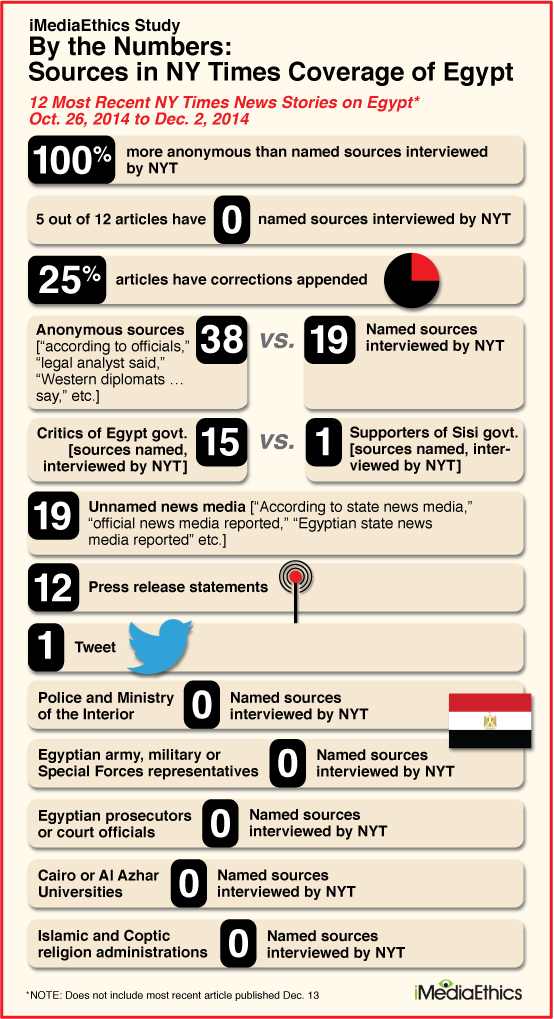
Non-for-profit media watchdog iMediaEthics has slammed The New York Times’ coverage of Egyptian affairs, citing fact checking failures and heavy reliance on anonymous sources.
The latest reports comes amid an investigative series run by iMediaEthics, part of Art Science Research Laboratory, which is cofounded by Rhonda Roland Shearer from the University of Iowa and the deceased Stephen Jay Gould from Harvard University.
In the report, iMediaEthics found that The New York Times’ Cairo Bureau Chief David Kirkpatrick has often relied on anonymous sources and has failed to contact officials from various institutions, including the Coptic Church, Al-Azhar, Universities and government officials, to fact check stories and for interviews.
In a summary, iMediaEthics found that 25 percent of Kirkpatrick’s 12 stories about Egypt from October 26 to December 2, 2014, required corrections.
The media watchdog also found that 12 stories relied on 38 anonymous sources, double the number of named sources. For example, in one story, there were just three named sources and 14 anonymous sources.
Additionally, iMediaEthics found that nearly half of the stories named no sources interviewed by the New York Times.
In regards to fact checking and covering the perspectives of other members of Egyptian society, the media watchdog found that the stories quoted 15 critics of Egypt’s government and just one government supporter. Moreover, coverage of student protests across Egypt’s universities did not quote any police, military or university officials.
Both Cairo University president Gaber Nassar and Al Azhar University spokesperson Dr. Amed Al-Zare said that no one had ever contacted their universities regarding the violence. In an interview with Nassar, the media watchdog found that The New York Times failed to report on attacks on university staff and university buildings.
iMediaEthics also found that Kirkpatrick heavily relied on certain sources. For example, 40 articles by Kirkpatrick quote the Egyptian Initiative for Personal Rights, while 23 articles have quoted Michael Hanna, a fellow at the Century Foundation who is a critic of the Coptic Pope.
Meanwhile, it was found that despite articles on Al-Azhar’s Grand Mufti and President Sisi’s National Advisor Fayza Abul Naga, neither were ever contacted by Kirkpatrick.
The Grand Mufti’s spokesperson told iMediaEthics that while CNN had interviewed the Grand Mufti, The New York Times had never contacted the Grand Mufti despite publishing a report claiming he supports the forced evacuation of citizens in Egypt’s Sinai.
Fayza Abul Naga meanwhile said she was not contacted and not given a chance of rebuttal after being called a ‘hostile official’.
In response to the claims by iMediaEthics, The New York Times has said it will conduct a review. The newspaper’s International Managing Editor Michael Slackman told iMediaEthics that The New York Times is always open to being contacted by officials and others that have issues with their coverage.
“Officials in Egypt know me. I was a correspondent based in Egypt for about eight years, and I have continued to visit every year since leaving in 2010. Officials there know that I am always open to hearing whatever issues they may have with our coverage. Please feel free to pass on my email or phone,” said Slackman to the media watchdog.
However, iMediaEthics criticized this response, adding that it is The New York Times’ job to contact sources (for fact checking purposes and to confirm reports) and that it is not iMediaEthic’s role as a watchdog to “pass on” Slackman’s contact information so that sources may contact him.
The media watchdog added that The New York Times must provide respect to sources, shown by “seeking them out, speaking to them and caring about accurately representing their positions.” This, iMediaEthics says, is “fundamental to building trust that fosters democracy.”







Comments (9)
[…] The New York Times’ Coverage of Egypt Slammed By Media Watchdog – Non-for-profit media watchdog iMediaEthics has slammed The New York Times’ coverage of Egyptian affairs, citing fact checking failures and heavy reliance on anonymous sources. The latest reports comes amid an investigative series run by iMediaEthics … […]
[…] http://egyptianstreets.com/2014/12/21/the-new-york-times-coverage-of-egypt-slammed-by-media-watchdog… […]